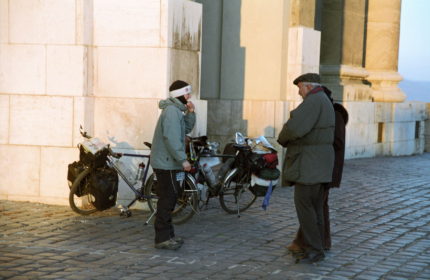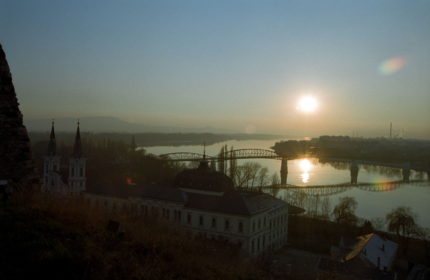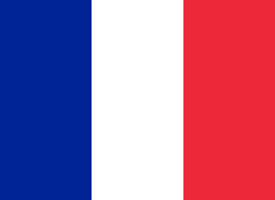
Hungarians are always willing to help
We crossed a bridge over the Danube into Hungary and noticed once again that the lines heading west were much longer than the ones heading east. A difference that we noticed immediately was that there were trees in Hungary. Alongisde the road and in the communities and towns. It made it easier for us to set up our tent more discreetly.
After passing the city of Gyor, we took a little detour south towards Pannonholma, a small town of approximately 3600 inhabitants where there is a UNESCO site. We visited the Pannonholma Monastery, headquarters of the Benedictine Order in Hungary. For more on the Pannonholma site, please visit the section entitled “UNESCO sites” under the Hungarian flag.
We battled a strong wind that day – perhaps the strongest we had dealt with thus far. The first half of the day was very tiring as we struggled to advance against the harsh wind. As we toured the Pannonholma Monastery, we had trouble even standing up against the wind. Along with everyone else, we leaned into it to keep from being blown over. Hats went flying.
As we left the monastery, I despaired of advancing any farther that day, but Stephane assured me that after only seven or eight more miles, the road changed direction, and then the wind would be with us. So we pushed on, and sure enough, the road eventually turned, and we found the wind at our backs. We now were advancing at such a rapid rate – yeah! – that I didn’t want to even stop for the night. We did, of course, and found one of the nicest camping spots that we had had since Germany.
As we rode north and east towards Budapest, we noticed that there are a lot of dogs in Hungary, too. In addition, there is a smell that is peculiar to Hungary that you wouldn’t notice unless you were bike touring through the countryside. Smoke comes from burning piles in people’s backyards and from their chimneys. It’s a strange smell, perhaps of burning plastic. It’s certainly not your normal wood-burning smell.
As we biked through the countryside, we noticed that many houses looked a little run-down and in need of repair. I suppose it’s not surprising, considering that 1/3 of the population lives below poverty level and that the average income per inhabitant is 160€/month. However, you might not notice it as much if you just stick to the cities. It is more obvious in the country.
We followed the Danube north of Budapest along what is called the Danube Bend. In essence, the Danube is forced to change its course about 40 km. (25 mi.) north of Budapest to follow the mountainous curves that form an S-shape. Instead of continuing east, the river flows south through Hungary and towards the former Yugoslavia. The bend is considered one of the most beautiful spots along the Danube. For more on the Danube Bend, classified as a World Heritage site by the UNESCO, please click here.

Danube in Hungary
We decided to stay at a guesthouse in Visegrad, halfway through the Danube Bend, in order to get up early in the morning to see the view from the fortress above the city. The Hungarians are very friendly and helpful. Upon arriving in the town, first one car and then another, stopped to ask us if we needed help finding our way. We followed signs pointing the way to a guesthouse, stopping to ring the bell. A man passed by just as the landlord was telling us that it was full, and he said he knew of a place if only we would follow him. His name was Attila, and we followed him first to one house, and then to another. Everyone said the same thing: their rooms were not winterized – they had no heat. He offered to let us stay at his place, but he lived at the top of the mountain next to the fortress, and he said it would take a good 1 to 1 ½ hours to bike there. I wasn’t keen to bike to the top of the mountain at that moment. So we continued our search, and he led us, grocery bags in hand, to four or five different houses until we found one that had a heated room available. Attila. A lawyer who spoke fluent English. He even helped us negotiate the price.
We had been told that Hungarians would bend over backwards to help you. Attila gave us his number and address and told us to meet him at his house the next morning before going to the fortress. Nice introduction to small town Hungary.
As we unloaded our bags and brought them into the house, the husband made the bed and the wife prepared hot tea and a snack for us. We met their son and their four-year old granddaughter. The family spoke only Hungarian and German, along with two or three words of English. We had noticed that many Hungarians speak German, reminders of their former ties to Austria. We managed on the little bit of German that we had picked up in Germany and Austria. The little girl, though, picked up several words of English in an instant and was eager to use them. Little kids are good like that.
They had a French TV channel. Our favorite one, too. How lucky! A documentary channel called “Arte.” We watched documentaries on the Czech Republic, on the European feminist movement, on the life of Muslim women in the Parisian suburbs, and a show on the animal kingdom. We were happy to see TV in a language we could understand.


